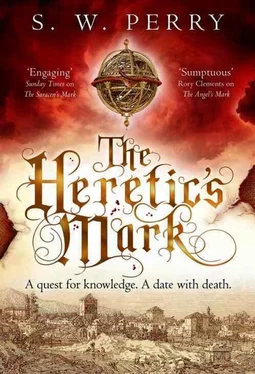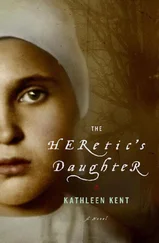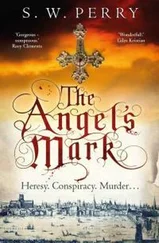And then she had learned the true reason why most of Den Bosch had abandoned her sermons: they had only been listening to her because she was a novelty. They had their own window into God’s plan for mankind. And it lay inside their own cathedral. And now she has summoned up the courage to defy Father Vermeiren and see it for herself.
Waiting for a gap in the flow of people passing through the great arched entrance, Hella picks her moment and slips inside.
The nave is cast in shadow, the pale slender columns reaching into the canopy of the roof like a forest made of stone. She can smell incense burning in sconces, and the dusty scent left by centuries of pious feet rubbing against the flagstones. Taking her place as close to the altar as she can, Hella pulls her plain cloth gown over her head, so that Father Vermeiren, should he see her, will take her for just another of the Beguines, come to hear his homily on how to live a pious life.
The painting stands behind the altar, resting on a gilded screen. As tall as Hella herself and half her height again in length, it is a triptych, its two outer panels folded inwards to hide the centre section. Thus, as Hella stares at it, wondering how it can possibly draw the citizens of Den Bosch away from God’s word as channelled through her, it reveals to her only the forms of two saints, each one painted entirely in shades of grey on the back of its folding wings. Their lack of colour reminds her of the images that often appear in her own head, images of her sister Hannie, of her parents: ghostly, insubstantial, always in danger of slipping away when she tries to fix them in her memory. Images of the dead, slain because she, Hella, hadn’t had the wisdom to heed the portents properly, hadn’t warned them of what was coming.
Hella can sense the growing excitement in the congregation as Father Vermeiren moves towards the altar, his deep booming voice calling them to penance. Two of his priestly procession move to the triptych and begin to open the side-panels, slowly, as though what lies within might blind them if revealed too suddenly.
The ripple of gasps that flows through the worshippers sounds to Hella like a cold wind blowing over tall grass in the dead of night. What they are seeing, most have seen before, but that does not stop the congregation giving a collective shudder, as if they are all part of the same frightened organism.
After that, Hella Maas hears nothing, not even Father Vermeiren’s great voice as he begins the liturgy. She feels nothing, not even the elbow of the person beside her as he pushes forward to get a better view. If she were a martyr, she wouldn’t feel the pain of the arrow as it strikes or the sword as it falls. Nothing exists except what she sees laid out before her on the now-open triptych. She feels a great wave sweep her up, carrying her into the images burning themselves into her eyes.
But it is no wave of holy exultation. It is a wave of terror. True, the window has been opened, and Hella Maas is staring through it. But she is staring not into heaven, hoping to see an imagined glimpse of sister Hannie and her parents – she is staring directly into hell.
In the privacy of their bedchamber, Bianca sits in the single chair and swings her legs so that her feet are resting on the edge of the bed. Her kirtle falls back over her knees.
‘Can Lord Lumley not help us?’ she asks. ‘Surely he can tell the queen you’re innocent.’
‘John Lumley may have her favour, but he’s still a recusant. The Privy Council will try to persuade her that he’s protecting a traitor. I won’t risk making things more hazardous for him. We’ve seen, with Dr Lopez, how easily the queen’s trust can be undermined.’
‘Then where do we go, Husband?’
‘I know the Low Countries well enough, from the summer I spent as a surgeon to the army of the House of Orange in the war against the Spanish occupation.’
‘Holland? But it’s crawling with English agents, isn’t it? You’ve told me before: the Privy Council has its watchers and informers everywhere.’
‘That’s true. And if the purse was heavy enough, they wouldn’t hesitate to take us by force.’
An idea pops into Bianca’s head, like a sudden flash of sunlight from behind a raincloud. ‘Then we choose somewhere where my own faith is in the ascendancy. A Catholic country.’
Nicholas considers this for a moment. Then he says, ‘You know very well that I have no time for religious factions, sweet. But I’d be exposed as a heretic the moment I opened my mouth.’
‘I can help you pass for a good Catholic, Nicholas,’ Bianca says with a bright laugh. ‘ If you’ll chance your immortal soul.’
‘According to Robert Cecil, it was damned the moment I fell in love with you .’ He grins. ‘But you know, it might just work. You’re a marvel, Mistress Merton.’
‘Do you have anywhere in mind, Nicholas? Please don’t choose some dull, provincial backwater. I would lose all joy in such a place.’
He thinks hard. ‘We need somewhere that Spanish rule is not too arduous; somewhere accustomed to foreign merchants and traders coming and going at will. A town where two new faces are scarcely worth remarking upon.’
‘Can you think of such a place?’
‘Without a moment’s pause, Wife. We’ll try Antwerp for a while.’
It is the obvious place, Nicholas tells her. It even has an exchange where they can convert English coin into gulden or ecu – though since the queen’s father debased the English currency, they will have to swallow the punitive exchange rate.
‘I’ve heard Antwerp is a fine city,’ she says, remembering three Dutch brothers who drank at the Jackdaw before the fire, Protestant weavers who had fled from the Spanish occupation.
‘Then Antwerp it shall be,’ Nicholas says. ‘Where better to lose ourselves than in the Duchy of Brabant?’
Bianca frowns. ‘But first we have to escape from England. What if they put a watch on the ports?’
Nicholas runs a hand through the black wiry tangle of his hair, as though to plough a disciplined furrow through his thoughts. ‘We must put our trust in the fact they have not issued a formal arraignment against me. That gives us a few days’ head-start. But we can’t delay.’
‘And if Essex, Coke or Popham sends men after us?’
‘We must misdirect them – lay a false trail.’
‘Then are we already fugitives?’
‘It would be foolish,’ he answers, ‘to think ourselves otherwise.’

The Tabard inn lies just off Long Southwark, south of the great stone gatehouse at the foot of London Bridge. You can spot it from a hundred yards away by the garish sign of a man’s tunic quartered with heraldic insignia. It boasts good lodgings, decent ale and livery stables where you may leave your horse if you are rich enough to own one, or rent one if you’re not. It is a pilgrims’ tavern. It marks the start of the spiritual road to Canterbury and on to St Peter’s in Rome, though with the queen’s new religion now firmly established, fewer use it for that purpose. Now it caters mostly for visitors bound for the city across the bridge.
Bianca Merton has always considered it a model of what a tavern in the Liberty of Southwark should be, although she baulks at the landlord’s toleration of the more brazen type of Bankside doxy. However, on the morning of the day after Nicholas’s release from Essex House, its greatest recommendation for Bianca and Nicholas is that the husband of Jenny Solver – Southwark’s most efficient gossip – is a regular.
They enter the stable courtyard as St Saviour’s bell tolls eight. Yesterday’s showers have brought out the sweet ammoniacal smell of manure from the stalls, along with the musty tang of old leather and horsehair. The ostler, Tom Prithy, greets them warmly. He is a man wholly suited to his role, with a long equine face and wide, trusting eyes arched by eyebrows too delicate for his runnelled complexion. He even has a habit of stamping his left foot when making a point, like an impatient courser. Prithy is a good man, and Bianca is reluctant to take advantage of him. But needs must.
Читать дальше













